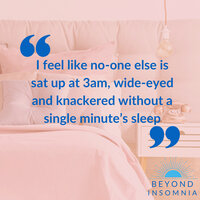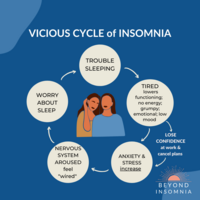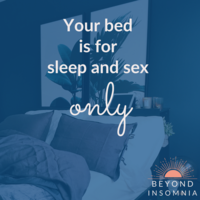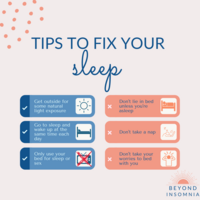

Insomnia is one of the most common problems women experience during perimenopause and beyond, affecting between 40-60% of menopausal and post-menopausal women at some point.
What is the menopause?
Menopause is the natural end of monthly periods that usually happens between the ages of 45 and 55 (in the UK, the average age is 51). You have gone through the menopause if you haven’t had a period for a year. Menopause is caused by a decline in the production of hormones by the ovaries.
As hormone levels drop, periods become irregular and eventually stop altogether. While menopause is a natural process, it can also be induced surgically or medically at any age. Surgical menopause can unfortunately produce severe menopausal symptoms.
Menopause affects each person individually. Some women don’t experience any difficulties. Most women will experience some symptoms, which can be mild and manageable or possibly difficult and debilitating. Commonly, these may include hot flushes/flashes, night sweats, sleep problems, mood changes, brain fog, fatigue, low libido, joint pain, weight gain and changes to hair and skin (to name just some).
What is perimenopause and what are the symptoms?
Perimenopause is the time leading up to menopause. This is when the body starts to produce less oestrogen and progesterone but levels rise and fall across the monthly cycle. You’re still getting periods but they might become more or less frequent with bleeding possibly becoming heavier or lighter than before.
For some women perimenopause can last for 8-10 years and may be a very difficult time. However, it may last for a much shorter time and women can sail through it.
A big problem with perimenopause can be when symptoms sneak up on you without you realising what is going on. Women may start to be affected from their late 30s/early 40s. In a rare number of cases, this can happen earlier. It can often be in hindsight that women look back and realise perimenopausal symptoms were affecting them.
Sleep problems and fatigue are often the first signs of perimenopause.
What is insomnia?
Insomnia is a very common sleep disorder. You will experience one or more of the following symptoms, for at least three nights per week and for at least three months:
- Difficulty falling asleep;
- Waking up during the night;
- Waking up too early in the morning; or
- Feeling unrefreshed after a night’s sleep.
Sleep problems can have a significant impact on your quality of life. Poor sleep is a serious issue that can lead to daytime tiredness, low mood, irritability, difficulty concentrating and increased appetite.
Insomnia can be caused by lots of different things. For example, menopause, a stressful event, being pregnant, having a baby, chronic stress, anxiety, depression, physical pain and grief. It can be a side effect of some medications.
People with chronic medical conditions such as arthritis or heart disease are also at risk for developing insomnia.
Why do we get insomnia during menopause?
Insomnia and waking-up feeling exhausted are common complaints during perimenopause. There are several possible explanations for why this may be the case.
One reason is that the levels of oestrogen and progesterone begin to decline during menopause, which can disrupt the body’s natural sleep-wake cycle. Hot flashes/flushes and night sweats can make it difficult to stay cool and comfortable at night, also leading to awakenings.
For some women, perimenopause may cause or worsen feelings of anxiety and insecurity, which may make it hard to fall asleep and can lead to waking in the night feeling panicky.
An increased need to go to the toilet during the night or pain from sore joints can also wake us up. Finally, our sleep changes with age naturally so none of us will sleep like we did in our twenties (sadly)!
What are some tips for getting a good night’s sleep during menopause?
Here are a few things you can do to help improve your sleep hygiene and make it easier to fall asleep and stay asleep through the night.
First, try to go to bed at the same time each night and wake up at the same time each morning, even on weekends. This will help to regulate your body’s sleep-wake cycle.
Second, create a relaxing bedtime routine that includes winding down for 30 minutes before sleep. During this time, avoid watching television or working on your computer, as the blue light from screens can interfere with sleep. Instead, try reading or listening to calming music.
Finally, make sure your bedroom is dark, quiet, and cool – temperature should ideally be between 16 and 18 degrees Celsius (59 and 65 degrees Fahrenheit). For more tips, read here.
For an in-depth guide to beating your insomnia, get my FREE guide: ‘Sleep Better, Start Today’








view comments . . .